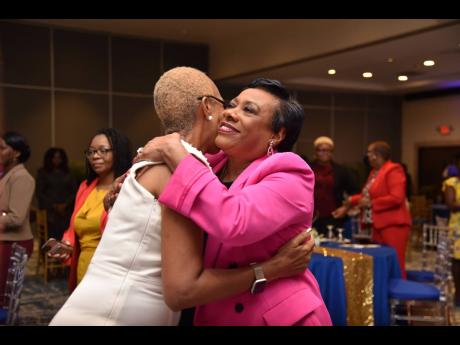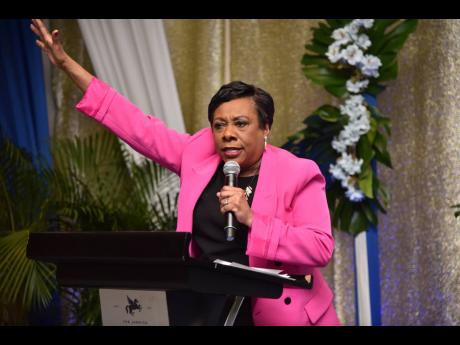US educator: Teacher salaries low due to gender pay gap in profession dominated by women
The low salaries paid to teachers can be attributed to the fact that the profession is dominated by women, President of the National Education Association, United States (US) Rebecca ‘Becky’ Pringle has asserted.
Pringle, who was the guest speaker at the Jamaica Teachers’ Association (JTA) Status of Women Conference, held at The Jamaica Pegasus hotel in New Kingston yesterday, argued that this issue is an extension of the global gender pay gap, which sees women generally receiving less pay than men.
“I don’t need to tell the people in this room that educators lack the dignity and respect and the pay that reflects the important work we do,” she said to much applause.
She noted that approximately 89 per cent of teachers in Jamaica are women, with the US also sharing a majority of 75 per cent. This results in what she said is the “‘wage penalty gap”, highlighting that in the US, that gap is 25 per cent.
“That means that the profession of teaching, when we compare it to other professions that are similarly situated, that means that they have the same level of education and they have the same years of service, we make 25 per cent less,” she said.
Data from a study conducted by the Caribbean Policy Research Institute in February last year revealed that women in Jamaica, on average, earn only 61 per cent of the income of males – a gap of 39 per cent.
The issue of a liveable wage for teachers has been a consistent one that permeates administrations, with educators often expressing their dissatisfaction with their salaries by migrating.
Pringle, in the meantime, called for a global collaboration of teacher unions with the goal to fight for equality and equity for its members.
“When women win, everybody wins,” she declared. “Because women are closest to the pain and the marginalisation and the inequities all over this world and we know those who are closest to the pain are closest to the real solutions that are systematic and sustained.”
Meanwhile, Minister of Education and Youth Fayval Williams stressed the “indispensable role” that women play in shaping the educational landscape of Jamaica.
“Through your dedication, resilience, and innovation, we have seen enriched learning experiences that continue to benefit our students, we’ve seen you inspire your colleagues, and we’ve seen you pave the way for a more inclusive education sector,” she said.
MULTIPLIER EFFECT
Highlighting the theme of the conference, which called for investment in women in order to accelerate progress, the minister emphasised the multiplier effect that such backing would have.
“It not only enhances the earning potential and economic independence of women, but it also improves outcomes for their families and communities simply because educated women are more likely to invest in their children’s education and thereby help in breaking the cycle of inter-generational poverty,” she said.
She was making reference to the Jamaica Multiple Cluster Survey 2022, recently released by the Planning Institute of Jamaica and the United Nations Children’s Fund, which revealed that women who attained a secondary education or higher are more likely to invest in their children’s education.
And while she noted that initiatives are under way to transform the education sector, she acknowledged that there is still more to be done.
One of those things, suggested Patricia Duncan-Sutherland, opposition spokesperson on gender, culture, and social transformation, could be an increase in the capital expenditure budget for the Ministry of Education to allow for greater resource allocation towards the infrastructure development of schools.
“The state of our schools is absolutely inadequate,” Duncan-Sutherland stated. “If we are going to create an environment of education for our children, we’re going to create a work environment that’s appropriate for teachers - 90 per cent of whom are women … we need to have a true programme to improve the quality of the plant of our schools,” she said.
Leighton Johnson, president of the JTA, praised the dominance of women in the education sector and underscored their value to the holistic development of students.
“If the education sector is holding our nation together, then the only conclusion that we can draw is that women play a significant role in holding our nation and the world together,” he said.


